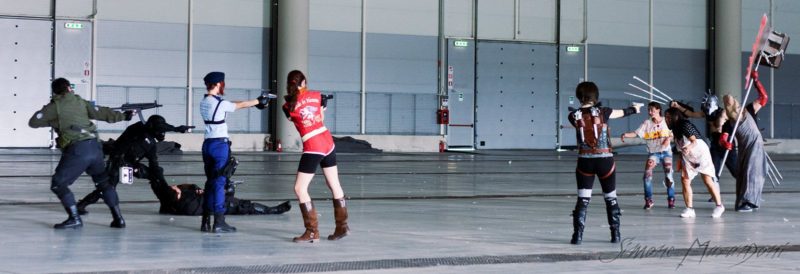
Anna Butler here today, totally incapable of a philosophical, thinkery type of post. All the w-t-f-ery going on in the world makes my head hurt, so I’m concentrating instead on things I can control. I’m at the climactic ending of my latest WIP, and consequently, I’ve got tunnel vision. I’m not ignoring the bigger issues going on around me, I’m just very focused on a teeny-tiny technical issue that’s having an immediate impact on my writing.
And that is, I’ve concluded that I am not a natural writer of action scenes.
My characters love to talk, you see. They’re quite happy to settle down and discuss… oh anything at all over a cup of coffee or whisky glass. They’ll cheerfully burble on about whatever topic crosses their minds, generally wanting to live quiet, peaceful existences where all their excitement comes from laughing and loving. Especially loving. They do like that and they’d like more of it, please.
 But when it comes to thrilling action scenes and I poke them with a sharp stick and tell them to ‘get on with it!’, they moan and groan and drag their feet, casting reproachful glances at me all the while. Even the ones who are supposed to be military. They do not co-operate. They hold up the coffee cups and beg for a refill. They turn to their best beloveds and beg for a kiss, keeping one eye on me to check my reaction, in the hope that I’ll relent in the face of all that gooey romanticism. They tell me they need to walk the dog, bake a cake, take their mum out for lunch… anything rather than bestir themselves and actually do something that requires running, jumping, and fighting. I don’t write people who like intense physical activity, it seems.
But when it comes to thrilling action scenes and I poke them with a sharp stick and tell them to ‘get on with it!’, they moan and groan and drag their feet, casting reproachful glances at me all the while. Even the ones who are supposed to be military. They do not co-operate. They hold up the coffee cups and beg for a refill. They turn to their best beloveds and beg for a kiss, keeping one eye on me to check my reaction, in the hope that I’ll relent in the face of all that gooey romanticism. They tell me they need to walk the dog, bake a cake, take their mum out for lunch… anything rather than bestir themselves and actually do something that requires running, jumping, and fighting. I don’t write people who like intense physical activity, it seems.
Which leads me to conclude I’m writing undoubted Mary Sues, because I’m not too fond of it myself.
Although if I’m honest, it isn’t my characters who are reluctant—I am. I find those sorts of scene horrible to write. Forcing them to do something more derring-do and buccaneering than asking for a macchiato rather than a latte forces me out of my comfort zone. I worry that it translates on the page to pedestrian, less-than-wholehearted prose.
There’s no help online, on these myriad blogs and websites ostensibly providing advice to writers. Type in “writing action scenes” and all you get are dozens of posts telling you how to stage a fist or sword fight. Which is all very well if you want to write Game of Thrones, but not that helpful if you want to describe an aeroship crash-landing, or someone falling off a high place.
So, I’ve come down to making several rules for myself that I’ll share here:
- Most action in real life lasts seconds, not minutes. If you have a close call in your car, say, it isn’t going to last for half an hour. It’s here and gone in an instant—without harming you, I hope! I’ve been in two minor car crashes and both were over before I processed what was happening.
- So, don’t let the scene last too long. It’s exhausting to write, exhausting to read. I don’t want a reader to plough through thirty pages of breathless activity and at the end be too tired to keep their eyes open long enough to get to the next chapter. (The one writer I’ll except is Vera Nazarian, who writes the Atlantis YA series. She writes chapter after chapter of action that I only wish I could emulate. I’m always wrung out by the end, but in a good way.)
- It’s disorientating—disorienting if you’re in the US!—for the person in the centre of things. They aren’t going to be waxing lyrical about the higher meaning of life when they’re in the middle of fighting for their own. Thought processes—what there are of them—will be truncated and messy, reflecting their bewilderment and panic. Adrenalin rushes aren’t about an intellectual grasp of the situation. They’re about fighting and fleeing, not thinking and talking. Processing, as in the case of my car accidents, comes later when things are quiet and there’s time for reflection.
- If they’re military (and my Shield heroes are, and Rafe Lancaster was) then they won’t stop to think about what’s best to do in a fight. They’re trained to a hair, and muscle-memory will get them through basic fighting moves. They analyse and react, fast. Very fast. So don’t expend paragraphs on them mentally debating the pros and cons of whether they should block that sword thrust and counter with a Zornhau or a Raddappio here. They’ll just do what it takes to win. And they’ll go all out. They’ll go for a body shot because it’s more certain to take down the enemy trying to kill them, rather than being a gentleman and pinking the enemy in the shoulder.
- Think like a choreographer working out the steps of a dance, so you have a mental picture of the protagonists’ positions and the moves they’ll have to make to get to the end of the scene. Draw diagrams if you need to (I usually do).
- Try to get sensory information in. Taste, touch and smell, not just the usual sight and sound. But again it’s going to be all fleeting impressions.
- Use short, sharp sentences. Forget grammar. Forget verb tense. I have no compunction at all about suddenly using present tense if that conveys more confusion and urgency. I always reckon the reader can cope.
And despite all this, I struggle to make the scene immediate and realistic. Here. I’ll share a scene from my WIP (the third Rafe Lancaster novel, tentatively called The God’s Eye) and you’ll see what I mean about the difficulty. Rafe’s the first-person narrator:
Tatlock was in the act of pulling himself over the edge, George beside him. He’d lost his bowler hat somewhere, and the shiny top of his head was ruddy. Despite the coolish winter day, his shirt armpits were wet. Mine smelled just as brackish and sour.
A few yards over, Ned was Günter’s anchor for this stage. He had just hauled himself onto the flat ledge, before pushing himself to his feet and doing what I’d done a few moments earlier: taking the anchor rope with both hands and bracing himself. He’d barely made it upright when there was a yell from below, and Ned jerked forward one step. Two. Flailing his arms, he dropped his hold on the anchor rope. It held only with the knot around his waist.
Hell!
Too close— too close. Edge— Ned! I hurtled forward. Grab Ned. Catch him. Catch— Got him. I wrapped both arms around him.
Haul him back. Hold him.
Both pulled forward. Günter must have— pulling Ned. Too close! Boot heels scraping against the rough blocks. Scrabbling for purchase.
Tatlock yelling, scrambling up over the sharp edges of the stones, stretching out his arms toward me. George’s face twisted.
Pull him back. Pull. Stamp down. Hard.
Scrk scrk of boot heels on rock. Force heels down. Step back. Pull Ned.
Something flashed past. Over edge. Theo?
Ow.
Blood. Spit it out. Spit it.
Scrk.
Ned huffed out a breath. “Hurts. Damn it.” He swept his arms around, closing his hands on the rope to take the strain off his body.
Thighs burning, now. Protesting. Drive them down to push back. One more step. Lean back. The weight of the world on the bloody rope…
Yelling. Who’s yelling?
Something grabbed me. Yanked me back.
And then I fell onto my backside, no chance of stopping myself, Ned still clutched to my chest and the dreadful pressure was gone. I landed on something softer than the ledge, that oof-ed out a breath and a complaint.
“Get off me! You’re heavy!”
Yeah. Action scenes are bloody hard.
So, tell me what, as readers, you look for in an action scene. What works for you and what doesn’t? If you’re a writer, how do you do it? Tips and recommendations very welcome!
And…. cut.
About Anna
![]() Anna was a communications specialist for many years, working in various UK government departments on everything from marketing employment schemes to organizing conferences for 10,000 civil servants to running an internal TV service. These days, though, she is writing full time. She lives with her husband in a quiet village tucked deep in the Nottinghamshire countryside. She’s supported there by the Deputy Editor, aka Molly the cockerpoo, who is assisted by the lovely Mavis, a Yorkie-Bichon cross with a bark several sizes larger than she is but no opinion whatsoever on the placement of semi-colons.
Anna was a communications specialist for many years, working in various UK government departments on everything from marketing employment schemes to organizing conferences for 10,000 civil servants to running an internal TV service. These days, though, she is writing full time. She lives with her husband in a quiet village tucked deep in the Nottinghamshire countryside. She’s supported there by the Deputy Editor, aka Molly the cockerpoo, who is assisted by the lovely Mavis, a Yorkie-Bichon cross with a bark several sizes larger than she is but no opinion whatsoever on the placement of semi-colons.
Website and Blog | Facebook | The Butler’s Pantry (Facebook Group) | Pinterest | Twitter | Sign up for Anna’s occasional newsletter
